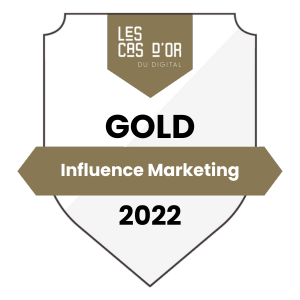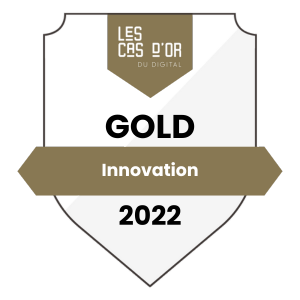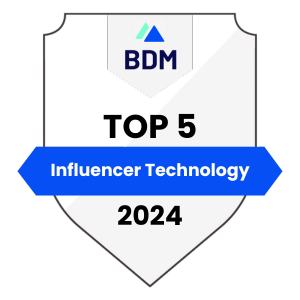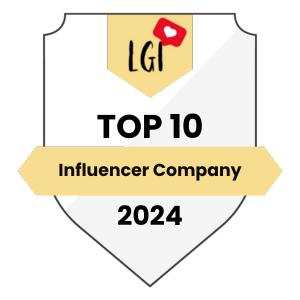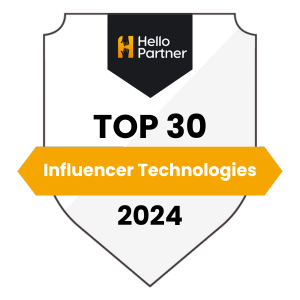Artificial intelligence (AI) and influencer marketing are two topics that have that have recently generated a great deal of interest due to their profound impact on our lives and work. On one side, generative AIs such as ChatGPT have gained traction in the media and left no one indifferent. While the tech giants (such as Google, Amazon and IBM Watson) are in a frenetic race for leadership, fashion giants such as Zalando and Undiz are leveraging these technologies to launch virtual assistants and create innovative advertising campaigns. On the other side, the influencer marketing sector is undergoing a phase of transformation marked by responsibility, transparency and the establishment of a legal framework for all parties involved. This is a crucial period for our industry, which continues to structure, diversify and evolve positively with the support of communities and technological advancements.
AI is playing an essential role in influencer marketing for some time now, and its importance will only grow in the years to come. Why is AI relevant in this context? How can it be integrated today? What will its future applications be, and to what extent can it impact the influencer marketing industry? This article provides answers to these captivating questions!
Why are AI-powered platforms important in influencer marketing?
Influencer marketing has become an essential part of digital marketing strategies, with forecasts indicating that the sector will be worth 21 billion dollars by the end of 2023. Companies are allocating a considerable proportion of their marketing budgets to collaborate with ambassadors, and this investment is constantly increasing. However, with the rise of the Creator Economy, the number of content creators is growing rapidly, generating a large amount of content and data.
In this context, it becomes crucial to make the right choices when selecting ambassadors and accurately measure the impact of campaigns and their return on investment (ROI). This is where platforms powered by artificial intelligence, such as Stellar, play an essential role. They offer marketers the ability to quickly and accurately identify the most suitable ambassadors, while tracking their content in real time. Without these technologies, it would be difficult to process, measure and forecast campaign data.
How are AI-powered technologies used in influencer marketing today?
Influencer marketing tools powered by artificial intelligence offer marketers the ability to decode social network dynamics and obtain insights that would be impossible to obtain manually. These technologies are mainly used to carry out three essential tasks: influencer research, profile analysis and campaign result evaluation. Due to the complexity of these tasks, they are facilitated by the utilization of system expert and machine learning, which are integrated into tools like Stellar.
These tools help marketers to:
- Identify a large number of influencers and provide detailed information on each of them, including their past performance, audience authenticity, and compliance with partnership transparency guidelines.
- Predict influencer performance even before launching a campaign by utilizing predictive models.
- Provide detailed reports on campaign performance, including in-depth analysis of initial KPIs and ROI.
AI-powered influencer platforms are therefore powerful tools for marketers, often utilized without them even realizing it. In the future, machine learning will make it possible to recommend influencers and campaigns that are more specific and personalized to the brand, based in particular on its previous campaigns.
How will tech and IA be used in influencer marketing in the future?
Influencer platforms are constantly evolving to meet to the changing needs of the ecosystem, and regularly integrating new social networks, formats, metrics and types of influencers (micro, nano, etc.). However, marketers face two key challenges in 2023: gaining a complete understanding of campaign results, and developing powerful concepts and content that stand out from the competition.
Understanding campaign performance: machine learning & sentiment analysis open up new horizons
Artificial intelligence-powered platforms are already capable of analyzing consumer sentiments towards a brand or product. They use natural language processing to detect emotions in text,a widely used technique in marketing to analyze customer reviews or monitor a brand’s online reputation. However, current tools do not yet provide the detailed insights required to fully comprehend the precise factors contributing to the success or failure of a campaign.
With the rise of machine learning, it is now possible in marketing to analyze how consumers feel about a brand or product. Sentiment analysis relies on natural language processing to detect emotions in a text, making it possible to analyze customer sentiment based on their emails, or monitor a brand’s online reputation on social networks through relevant mentions.
By using this model in the field of influencer marketing, it becomes possible to analyze community reactions to a campaign through the comments it generates on content creators’ posts. This is a major step forward, as current campaign reports do not contain the detailed information needed to understand the precise factors that contribute to the success or failure of influencer campaigns. Thanks to sentiment analysis and semantic analysis, we can now determine the exact results of the campaign, and even identify purchase intentions or brand expectations. This progress enables brands to improve their influencer marketing strategies, design more effective campaigns, tailor their message and establish deeper connections with their target audience.
At Stellar, we integrate this intelligence into our platform, enabling brands to analyze the reactions of the influencers’ followers to their campaigns by looking closely at the comments on their posts. This qualitative analysis supplements the traditional quantitative data found in our campaign reports, enabling us to provide comprehensive explanations of performance that incorporate the sentiments expressed by communities.
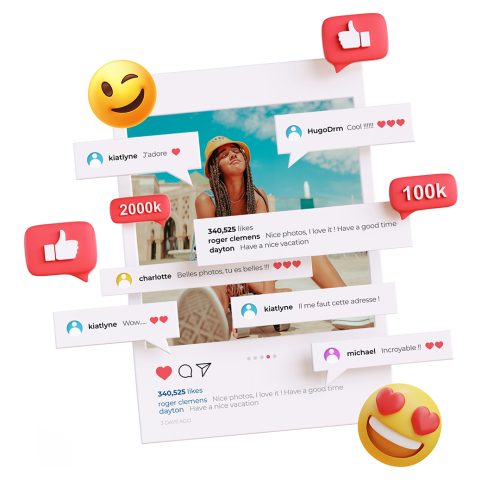
Add a new dimension to your reportings with comment analysis
By analyzing comments and reactions, Stellar now enables you to discover product and brand appreciation, as well as purchase intentions, through your influencer campaigns.
Fill in the form and get exclusive access to the beta version of the new comment analysis functionality.
Stellar will use your contact data to offer you its product and services. This information will be used in accordante with its data management policy. You can unscuscribe at any time.
Rethinking creativity and strategy: Using generative AI to stand out from the crowd
The use of generative artificial intelligence, in particular ChatGPT, offers considerable potential for the creation of unique and impactful content. ChatGPT is an AI system specialized in natural language processing, which relies on deep learning techniques to provide answers, information and generate creative texts. In addition, there are other generative AIs such as Dall-e and Midjourney, which are capable of creating images, videos, music and more. According to the Husbpot study, these technologies are proving to be valuable marketing assets, enabling professionals to generate content more efficiently and on a larger scale.
The question now is: Can these generative AIs really deliver great content? French Content creators such as Michou and You Make Fashion have gladly taken up the challenge, actively engaging with ChatGPT to explore its capabilities.
To answer this question, Stellar has taken the initiative to explore the potential of using generative AIs at different stages of an influencer campaign, unveiling numerous possibilities. These AIs can generate campaign ideas, creative concepts, identify influencer profiles, create influencer avatars, prepare briefs in different formats, write contracts, scripts and post captions. In addition, they can transform these posts into ads for wider amplification and even produce press releases, among other functions.
Crucially, however, human expertise remains essential. While generative AIs can propose ideas, they can sometimes generate obvious concepts that need to be examined more closely to avoid leaning on conventional or overused approaches. A marketing expert is needed to guide the AI from the start and assess the quality of the proposals generated. In addition, it’s vital to adapt the ideas generated to the brand, its values and the specific attributes of its products or services.
There’s no doubt that ChatGPT has enormous potential as a valuable tool in influencer marketing, as long as its capabilities and limitations are properly understood. It does not replace the expertise of an expert, but rather serves as an assistant, taking over repetitive tasks such as brainstorming and writing e-mails. In this way, the expert can concentrate on what really matters: creating original, high-quality content that truly captivates the target audience.
Things to remember
- AI-powered platforms have become a must for influencer marketing strategies, offering brands the ability to quickly discover relevant influencers, track their performance in real time, analyze consumer sentiment and generate automated content.
- The future of influencer marketing will be shaped by the next breakthroughs in technology and AI, offering sophisticated features that improve understanding of campaign results and enable the creation of engaging and unique content.
- It's essential not to approach artificial intelligence with apprehension, as it doesn't seek to replace human expertise, but rather serves as a valuable ally. By collaborating with AI, marketers can leverage its capabilities to improve productivity, save time and focus on higher value-added tasks. The key lies in mastering AI and using it as a tool to supplement and amplify our human expertise, creativity and intuition.
- Artificial intelligence, illustrated by tools like ChatGPT, offers interesting perspectives for influencer marketing. Nevertheless, it is essential to consider the ethical implications and to work actively on regulation and innovation in order to fully leverage these developments while ensuring responsible and beneficial use for all.




